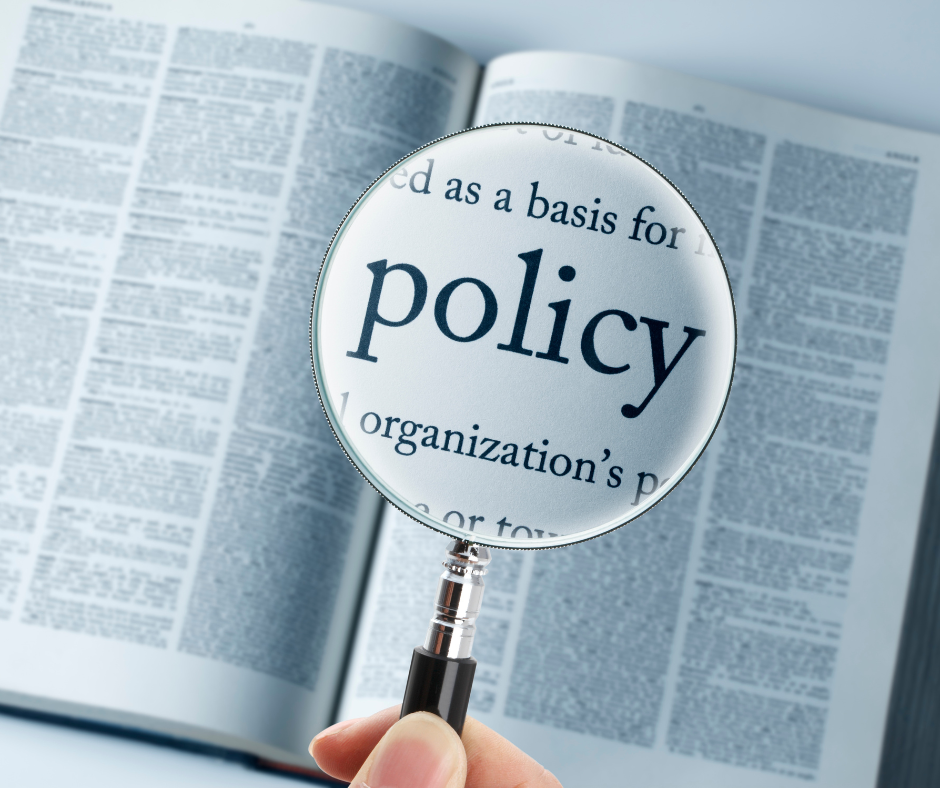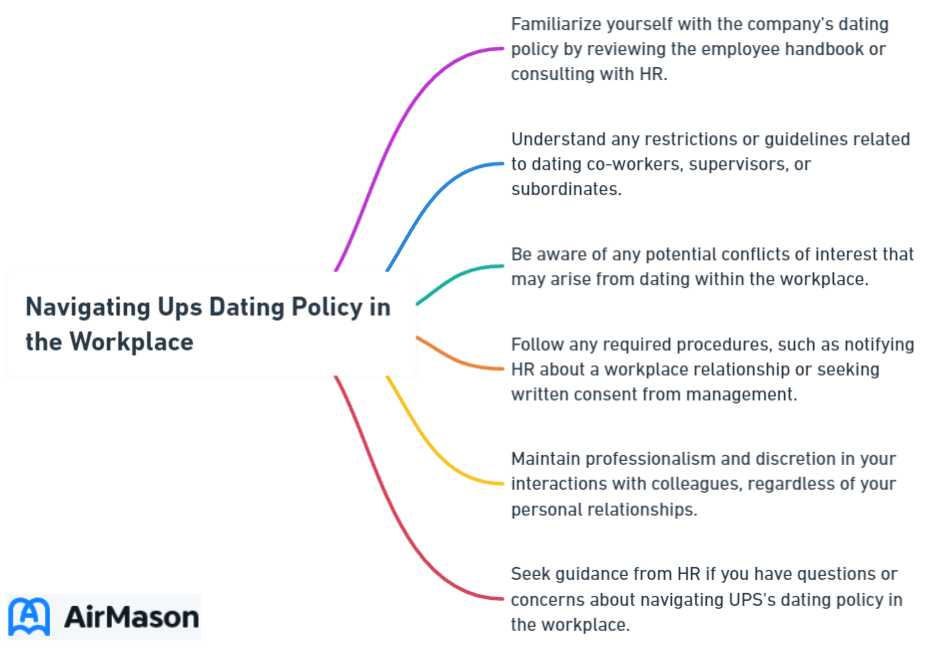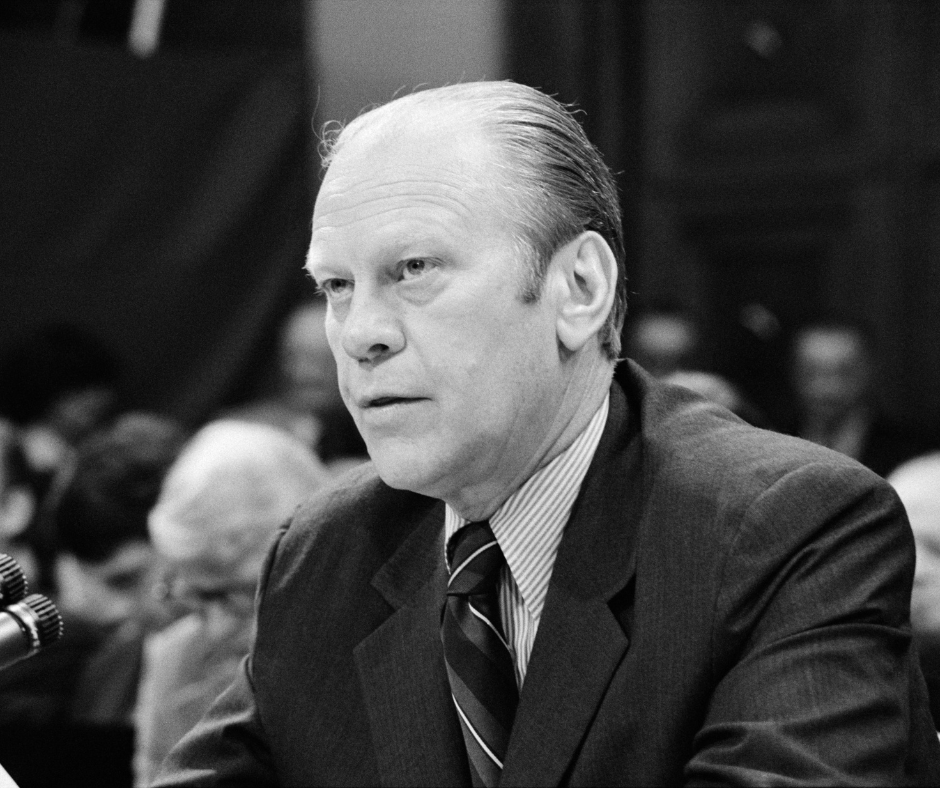
Navigating UPS Dating Policy in the Workplace is crucial for maintaining a professional work environment and avoiding potential conflicts. As workplace relationships can have significant consequences, it is essential to understand the legal aspects and best practices for implementing dating policies. This blog post provides insights into UPS Dating Policy and offers guidance for managing personal relationships in the workplace, addressing legal concerns, and implementing effective company dating policies.
Key Takeaways
- UPS Dating Policy seeks to maintain a professional workplace by prohibiting supervisors from engaging in romantic relationships with their subordinates.
- Employees must balance work and romance, disclose any familial or close personal relationships to HR, and handle breakups professionally.
- Companies should establish clear guidelines for implementing dating policies, educate employees on the policy, and review it periodically.
Understanding UPS Dating Policy
UPS Dating Policy explicitly states that management employees are not permitted to engage in romantic or dating relationships with other UPS employees. This policy aims to uphold a professional work atmosphere and avert potential conflicts, especially when it comes to management dating employees. In some extreme cases, workplace relationships have led to:
- violent breakups
- property damage
- depression
- suicides
While UPS discourages employees from dating colleagues, it doesn’t implement a strict “no dating” policy for non-management employees. However, the policy emphasizes that any romantic involvement should not negatively impact the work environment or create conflicts of interest.
The Purpose of UPS Dating Policy
UPS Dating Policy primarily aims to mitigate potential risks and uphold a professional work environment. Romantic relationships in the workplace can potentially lead to decreased productivity, especially when there is a direct reporting relationship between the involved employees. As a result, UPS has implemented guidelines and boundaries for how romantic relationships are conducted within the workplace to avoid conflicts of interest, favoritism, and potential harassment issues.
UPS Dating Policy sets expectations and limitations on the employment of relatives and employees involved in close personal relationships with other employees. This promotes professionalism, avoids conflicts of interest, and cultivates a harmonious work environment while still respecting individual freedoms and choices.

Key Components of UPS Dating Policy
The UPS Dating Policy outlines specific guidelines for workplace relationships. Management employees are not permitted to be involved in romantic or dating relationships with other UPS employees. Furthermore, UPS employees must not use personal relationships to influence dealings with customers, potential customers, or other entities.
The policy prohibits supervisors from engaging in romantic relationships with their subordinates, regardless of their sexual orientation, eliminating potential accusations of favoritism and misuse of power.
In addition to these guidelines, the UPS policy on fraternization in the workplace disallows romantic relationships between managers and hourly employees. Violations of the UPS Dating Policy may result in disciplinary action, including termination of employment.
Consequences of Violating UPS Dating Policy
Violating UPS Dating Policy could result in serious consequences, such as disciplinary actions and even job termination. In the event of a violation of the policy, disciplinary action up to and including termination of employment may be taken. There are documented records and case studies of UPS employees being held accountable for disregarding the company’s dating policy.
UPS has a procedure in place for addressing breaches of their dating policy. Consequences of violations of UPS policies may include disciplinary action, up to and including termination.
Managing Personal Relationships in the Workplace

Personal relationships in the workplace require careful balancing of work and romance, disclosure of relationships, and professional handling of breakups. It is essential to ensure that professional and personal matters remain distinct, and that relationships do not interfere with work.
Disclosing employee relationships to Human Resources is crucial to guarantee that the relationship does not create any issues in the workplace. Additionally, employees must be cognizant of the potential uneasiness that may result from breakups and be equipped to address them in a professional way.
Balancing Work and Romance
Maintaining professionalism in a workplace romance is critical for:
- Fostering a healthy work environment
- Preventing conflicts of interest
- Preserving professional boundaries
- Preserving the respect and trust of colleagues and superiors.
When engaging in a workplace relationship, it is crucial to take on the initial responsibility of:
- Approaching the situation with empathy
- Determining the level of personal information to be shared
- Respecting others’ boundaries
- Prioritizing tasks
- Ensuring that time is reserved for self-care and reflection
A human resources manager should guide employees in reviewing questions from Psychology Today to ensure they are taking the appropriate steps to balance work and romance.
By setting boundaries and maintaining professionalism, employees can navigate romantic relationships in the workplace while preserving a harmonious work environment.
Disclosing Relationships to Human Resources
As per the UPS Relationship Policy, employees must seek approval from the relevant Human Resources authority for hiring, placement, and promotion of individuals with familial or close personal ties. Failing to disclose a personal relationship to human resources at UPS could result in conflicts of interest, contravention of company policies, and potential disciplinary action.
It is essential to disclose personal relationships to ensure transparency and uphold a professional work environment. UPS Human Resources implements the following policies to address disclosed relationships between employees:
- ‘Duty to Disclose’ policy: This policy requires employees to disclose any romantic or dating relationships with other UPS employees.
- ‘No Retaliation’ policy: This policy ensures that employees who disclose their relationships will not face any retaliation.
- Management employees are strongly advised to refrain from romantic or dating relationships with other UPS employees.
- The company strictly prohibits non-consensual relationships.
Navigating Breakups and Awkward Situations
Navigating a workplace breakup requires the following:
- Separating work from personal matters
- Avoiding drama
- Treating the ex-partner as a regular colleague
- Setting boundaries
- Avoiding gossip
It is advisable for an employee, including former employees, to concentrate on their work, abstain from exhibiting negative behavior towards their ex-partner, and treat them with courtesy.
An employee may seek support from colleagues in the same department, friends, family, or a professional counselor.
By maintaining professionalism and focusing on work, employees can navigate breakups and awkward situations without jeopardizing their job or the workplace environment.
Legal Aspects of Workplace Dating Policies

Potential legal risks associated with workplace dating for employers and employees include varying state laws, misleading policies, and potential discrimination and privacy issues. Generally, employers are within their rights to prohibit or restrict dating in the workplace. However, there may be some jurisdictions where employers are unable to prohibit coworkers from dating.
Employers need to have clear workplace dating policies to prevent legal and employee relations issues. UPS’s dating policy complies with the varying state laws by stipulating that, where applicable, local, state, or country laws shall take precedence over the policy. This implies that if there are particular laws in a particular state regarding workplace dating, those laws shall supersede UPS’s policy. UPS reserves the right to abide by the pertinent laws and regulations in each state.
Varying State Laws and Their Impact on UPS Dating Policy
Defining terms related to dating policies in employee contracts can help prevent misunderstandings and ensure a professional work atmosphere. In most states, employers have the right to prohibit or restrict dating in the workplace. However, some states may have different regulations regarding workplace dating policies. It is essential for employers to explicitly communicate their policies on dating among employees, whether it is prohibited or discouraged.
Different states may have different regulations and restrictions surrounding workplace relationships, which can affect how UPS enforces its dating policy. For instance, some states may have stricter regulations on workplace relationships, while others may have more lenient policies. Consequently, UPS must take into account these varying state laws when implementing and enforcing its dating policy.
Preventing Discrimination Claims
UPS has implemented a dating policy that prohibits romantic and dating relationships between management employees and other UPS employees. This policy helps to create a fair and equal work environment for all employees, reducing the risk of discrimination claims by eliminating potential favoritism, bias, or unfair treatment based on personal relationships within the workplace.
To prevent discrimination claims in a dating policy, it is recommended to:
- Abstain from ignoring workplace relationships
- Fail to implement effective anti-sexual harassment policies
- Not require sufficient disclosure
- Lack leadership, accountability, and strong harassment policies
- Not reduce risk factors.
By establishing clear guidelines and educating employees about the employees dating policy, companies can promote a fair and inclusive work environment.
Addressing Sexual Harassment Concerns
It’s necessary to address sexual harassment concerns in the workplace, equipping employees with the knowledge, resources, and techniques to recognize and prevent such incidents. Employees should receive comprehensive training on preventing sexual harassment in the workplace, including:
- Education on what constitutes acceptable and unacceptable behavior
- The relevant laws and regulations related to sexual harassment
- The rights and responsibilities of employees
UPS should implement the following measures to establish a supportive reporting system for sexual harassment:
- Clear policies
- Confidentiality
- Multiple reporting channels
- Training and awareness programs
- Supportive environment
- Prompt and thorough investigations
- Supportive measures for individuals who report harassment
Case Study: Gerald Ellis vs. UPS

The case of Gerald Ellis vs. UPS explores a legal dispute involving UPS Dating Policy and its implications. Gerald Ellis, a former UPS employee, claimed wrongful termination due to his romantic relationship with a coworker.
The court ruling in this case highlighted the importance of clear and consistent dating policies in the workplace.
Background of the Case
Gerald Ellis was a Hub Supervisor at UPS who claimed wrongful termination due to his romantic relationship with a coworker. The role of UPS Dating Policy in the dispute was central, as UPS has a policy prohibiting management employees from dating other UPS employees.
The case of Ronald Watkins vs. United Parcel Service, Inc. involves a similar situation, where Watkins, a division manager at UPS, initiated a lawsuit against UPS for his termination due to his violation of the company’s anti-fraternization policy.
Court Ruling and Implications
In the Gerald Ellis vs. UPS case, the primary argument presented by Ellis during the trial was that UPS did not have a valid, nondiscriminatory reason for his dismissal. Conversely, UPS argued that they had a valid reason for terminating Ellis and that his termination was justified.
The court ruling in this case challenged the UPS Dating Policy and its implications. The court ruling in the case of Watkins vs. UPS had an effect on UPS’s dating policy. The policy on UPSers.com explicitly states that management employees are to “strictly abstain” from romantic and dating relationships with other UPS employees. This policy was likely implemented or reinforced due to the court ruling.
Best Practices for Companies Implementing Dating Policies
Companies looking to implement dating policies can benefit from establishing clear guidelines, educating employees, and regularly reviewing policies. Key elements to consider when establishing a clear company dating policy include defining relationships, disclosure requirements, conflict of interest guidelines, consensual relationship agreements, non-discrimination and harassment policies, confidentiality and privacy, and consequences for policy violations.
By examining and revising dating policies periodically, companies can ensure adherence to changes in labor laws, employ optimal practices, and maintain a productive work atmosphere. The rate of these assessments may differ based on the particular necessities and conditions of the company. It is recommended to evaluate dating policies at least annually or when noteworthy modifications take place in the organization.
Establishing Clear and Consistent Policies
A well-defined and consistent dating policy is key in promoting transparency, professionalism, and fairness, preventing conflicts, fostering a positive workplace culture, and creating a congenial work atmosphere. To ensure the dating policy is clearly understood by all employees, companies should develop a comprehensive dating policy, communicate it effectively, provide training and education, encourage open communication, and regularly review and update the policy. Some companies may choose to implement no dating policies to avoid potential issues altogether.
These clear and consistent policies help prevent misunderstandings and ensure a professional work environment. Implementing a dating policy that is well-defined and consistently enforced reduces the risk of legal disputes, such as the cases of Gerald Ellis and Ronald Watkins vs. UPS.
Educating Employees about the Policy
Continuous training is vital for keeping employees informed about the company’s dating policy. It ensures that employees are familiar with the policy and its implications, and are aware of how to comply with it. Companies can provide the following types of training to educate employees on dating policies:
- Compliance training
- Orientation training
- Onboarding training
- Technology-based learning
- Simulators
By educating employees about the dating policy, companies can promote awareness and compliance, reducing the likelihood of workplace conflicts and legal disputes. Ensuring employees understand the dating policy and their roles in adhering to it is crucial for maintaining a harmonious and professional work environment.
Regularly Reviewing and Updating Policies
Companies need to revise and update their dating policies every one to three years to ensure consistency, effectiveness, and compliance with regulations and industry standards. At a minimum, the policies should be reviewed annually.
Regularly reviewing and updating policies ensures they remain relevant and effective in addressing workplace dating concerns. Companies can stay informed about changes in labor laws and industry trends, adjusting their dating policies accordingly to maintain a productive and professional work environment.
Summary
Understanding and implementing an effective dating policy, such as UPS Dating Policy, is crucial for maintaining a professional work environment and avoiding potential conflicts. By establishing clear guidelines, educating employees, and regularly reviewing policies, companies can create a harmonious workplace that respects individual freedoms while minimizing risks associated with workplace relationships. As demonstrated by the case study of Gerald Ellis vs. UPS, having a well-defined and consistent dating policy is essential for reducing legal disputes and fostering a fair and inclusive work environment.
Frequently Asked Questions
Are UPS employees allowed to date?
UPS has a non-fraternization policy which does not allow managers to have romantic relationships with any hourly employee, even if the employee is not being supervised by the manager. Therefore, it is not allowed for UPS employees to date.
What is the UPS non fraternization policy?
UPS has a strict non-fraternization policy that prohibits managers from having romantic relationships with hourly employees, in order to prevent any perceived favoritism.
What is the UPS golden rule?
The UPS golden rule is to treat others as you would expect to be treated, with a zero tolerance policy.
What are the potential legal risks associated with workplace dating for employers and employees?
Legal risks associated with workplace dating for employers and employees include potential discrimination and privacy issues, state laws that may vary, and misleading policies.
What measures can companies take to educate employees about their dating policy?
Companies can educate employees on their dating policy through compliance training, orientation training, onboarding training, technology-based learning, and simulators.